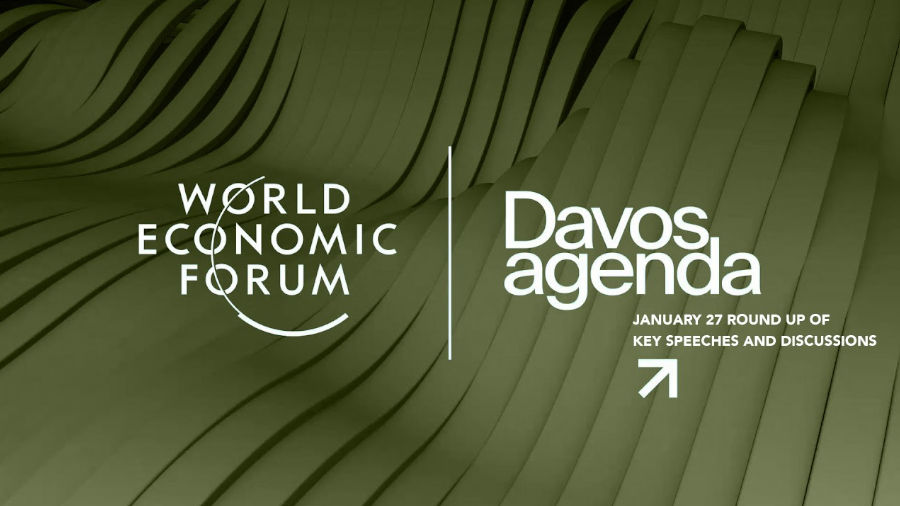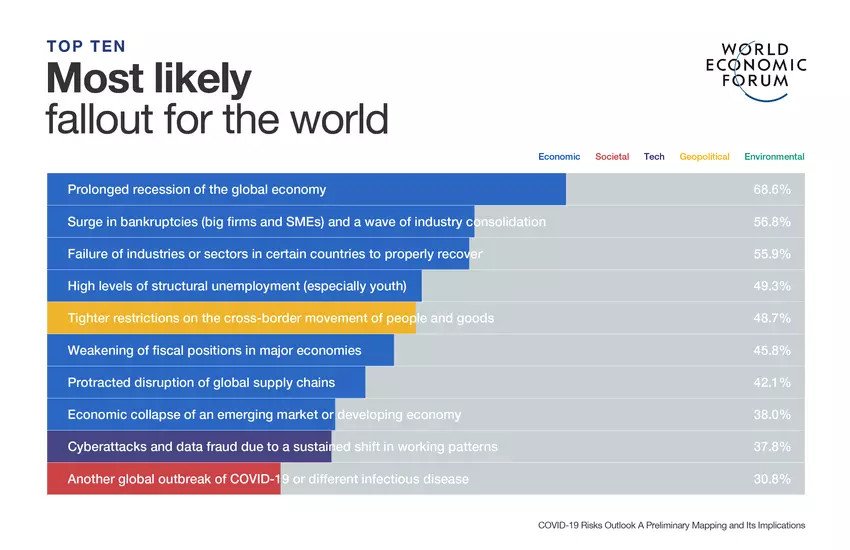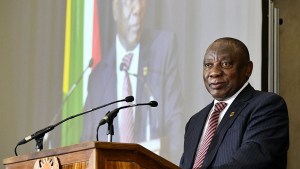World Economic Davos Forum 2021 : Agenda, Speeches, & Discussions: Daily Rolling Coverage – January 27 Highlights

January 27 Highlights
Updated daily
Compiled by Chris Devonshire-Ellis
- Special Address by Ursula von der Leyen (President, EU Commission)
- Special Address by Cyril Ramaphosa (President of South Africa)
- Speeches by Angela Merkel, Emmanuel Macron
- Re-Assessing Corporate Risks And Re-Inforcing Resilience
- Strengthening The Financial & Monetary System
- Designing Connected & Sustainable Value Chains
- Reimagining Manufacturing For Growth
- Rethinking Cities For A Post Covid Future
- Resetting Consumption For A Sustainable Future
- Preparing For Deglobalization
The World Economic Forum is taking place between January 25-29, and this year is being virtually. Over 2,000 Government, business and academic leaders are attending under the theme of “A Crucial Year to Rebuild Trust”, including 25 heads of state, and 600 global CEOs.
The World Economic Forum has released a chart of current global problems that the Davos meeting is expected to discuss. These can be seen here:

The theme for each day’s discussions has been planned and is as follows:
Monday January 25
“Designing cohesive, sustainable, resilient economic systems”
Tuesday January 26
“Driving responsible industry transformation and growth”
Wednesday January 27
“Enhancing stewardship of the global commons”
Thursday January 28
“Harnessing the technologies of the Fourth Industrial Revolution”
Friday January 29
“Advancing global and regional cooperation”
We will be bringing analysis and commentary of each day’s agenda during the week, with an Executive Summary next Monday, February 1st. To ensure you receive this, please obtain your complimentary subscription here
The World Economic Forum, or Davos (as it is usually held there) is an annual event often looked at for political signals between the larger nations. As such commentary involving China and the United States will be especially focused on with a new American President just in office amid the past two years of trade friction between the countries. However, apart from this major focal point, a great deal of effort will be spent on global, rather than bilateral challenges, and we shall be looking at the impact of these as opposed to purely the US-China rivalry. This feed will be updated daily.
Comments On Yesterday’s Davos Sessions, Tuesday January 27
Yesterdays events were mainly European flavoured, with Ursula von der Leyen’s speech touching mainly on Climate Change and Big Tech. Her speech can be read here.
Angela Merkel commented on bureaucracy as an inhibitor and a lack of digitization, her speech can be read here while Emmanuel Macron’s speech touched on a need to reinvent ‘modern capitalism’ and that a disconnect has been allowed to grow between “value creation and profit,” and that the world had become divided between ‘Kings and Consumers’. His speech can be heard here.

The South African President Cyril Ramaphosa gave the Keynote Address, essentially representing the African global community. His speech touched on Climate Change, Inequality of Covid Vaccine distribution, the need for Africa to continue its massive pan-African infrastructure build, and increasing South Africa’s export potential. His comments have particular resonance within the context of China and the Belt & Road Initiative and can be seen here.
In terms of business and investment issues, the following subjects were the most applicable from yesterdays sessions:
Re-Assessing Corporate Risks And Re-Inforcing Resilience In A Post-Covid World (Option 1)
The increasing frequency and severity of a range of catastrophic risks beyond pandemics has made greater resilience a critical leadership challenge. What best corporate practices and cross-sector partnerships help deliver a more sustainable and proactive response to future catastrophic shocks?
Re-Assessing Corporate Risks And Re-Inforcing Resilience In A Post-Covid World (Option 2)
Strengthening The Financial & Monetary System (Option 1)
Governments responded swiftly to the COVID-19 pandemic by providing fiscal and monetary support as well as adapting regulatory requirements to this new context. This discussion assesses the current health of the financial system, identifies potential emerging financial risks resulting from these historic interventions, and reflects on how industries and governments can work together to make key financial institutions more resilient in 2021.
Strengthening The Financial & Monetary System (Option 2)
Designing Connected & Sustainable Value Chains (Option 1)
COVID-19 is accelerating the change of global value delivery models, with unprecedented consequences for manufacturing value chains. From new data-powered ecosystems to the latest approaches of circularity in manufacturing, how can value chains be redesigned for greater productivity and innovation? This session includes ‘Accelerating Sustainable Production through Digital Traceability’, and ‘Unlocking Value in Manufacturing through Data Sharing’.
Designing Connected & Sustainable Value Chains (Option 2)
Reimagining Manufacturing For Growth
While lockdowns and demand shocks are undermining recent economic progress, manufacturing companies have a unique opportunity to reinvent themselves and become an engine of economic growth. What policies, practices and partnerships are needed to transform operating and business models to boost productivity while creating new value for companies, society and the environment?
Rethinking Cities For A Post Covid Future (Option 1)
COVID-19 has transformed homes into classrooms and offices while changing the face and pace of cities and urban centres.
What policies, plans and partnerships are needed to ensure cities thrive in this new urban future? This session is associated with the World Economic Forum’s Future of Cities Initiative.
Rethinking Cities For A Post Covid Future (Option 2)
Resetting Consumption For A Sustainable Future
At current consumption levels, the equivalent of almost three planets would be required to sustain a world of 9.6 billion by 2050. What policies, practices and partnerships are needed to place responsibility and sustainability at the core of industry and government initiatives in a post-COVID world? This session is associated with the following projects and initiatives of the World Economic Forum: Healthy Cities and Communities, Consumers and Climate Change, and Consumers Beyond Disposability.
Preparing For Deglobalization
The COVID-19 pandemic has accelerated and deepened a secular trend towards deglobalization, threatening the growth models of poor countries that previously used trade as a path to prosperity. This expert briefing examines the global implications of the COVID-19 crisis and the road ahead.
Sessions from Monday’s events included:
Keynote speech from Xi Jinping; Responding To The Covid-19 Crisis In Asia; Building Crisis-Resistant Healthcare Systems In A Post Covid World; Restoring Economic Growth; Building Net-Zero Cities; New Pathways To Economic Transformation; Developing The Evolution Of Stakeholder Capitalism, and Resetting Digital Currencies and can be accessed here.
Related Reading
- Asia Cooperation Dialogue, 17th Foreign Ministers’ Meeting: “The New Normal and Safe and Healthy Tourism”
- China’s Foreign Minister At The Belt & Road Forum For International Cooperation: Analysis Of Wang Yi’s Statements, And The Impact On China FDI & ODI In 2021.
About Us
Silk Road Briefing is written by Dezan Shira & Associates. The firm has 28 offices throughout Asia, and assists foreign investors into the region. For strategic advisory and business intelligence issues please contact the firm at silkroad@dezshira.com or visit www.dezshira.com





